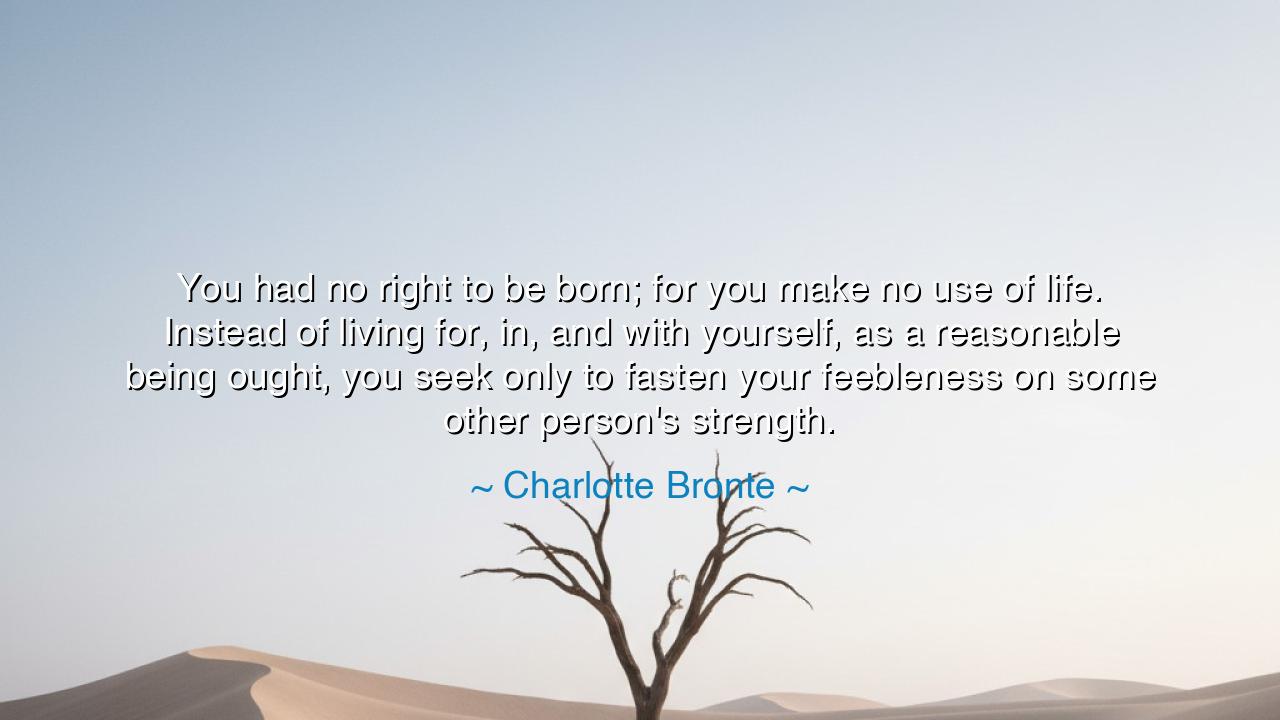
You had no right to be born; for you make no use of life.
You had no right to be born; for you make no use of life. Instead of living for, in, and with yourself, as a reasonable being ought, you seek only to fasten your feebleness on some other person's strength.






Hear the fierce and uncompromising words of Charlotte Brontë: “You had no right to be born; for you make no use of life. Instead of living for, in, and with yourself, as a reasonable being ought, you seek only to fasten your feebleness on some other person's strength.” These words strike like a thunderbolt, stripping away illusions and calling the soul to account. They reveal the ancient truth that life itself is a sacred gift, and to waste it in dependence, in idleness, in the clinging of weakness upon others, is to betray both oneself and the very breath that sustains us.
Brontë’s voice here is not gentle, but stern, as the voice of a prophet chastising a wayward people. She reminds us that each human being is born not merely to exist, but to live with reason and strength. To live “for, in, and with yourself” is to honor the dignity within, to develop the gifts you have been given, and to stand as a whole being before the world. Those who refuse to do this, who instead burden others with their feebleness while giving nothing in return, are like barren trees that drink water yet bear no fruit.
Consider the lesson of ancient Rome. The citizens who built the Republic were men and women of discipline, carrying their own weight and offering their strength for the common good. But as generations passed, many fell into dependence on bread and circuses, seeking sustenance and entertainment from the state while contributing little themselves. Their feebleness drained the strength of others, and the empire decayed from within. Here Brontë’s warning resounds: a life wasted in leaning upon the vigor of others corrodes not only the individual but the society they inhabit.
So too in the modern world we find examples of this truth. Recall the story of Helen Keller, who though born blind and deaf, refused to live by fastening her limitations upon others. Through tireless effort and with the guidance of her teacher, she discovered her own power to learn, to write, to speak to the world. She lived “for, in, and with” herself, not as a dependent, but as a contributor to humanity’s spirit. Her life rebukes all who squander their opportunities, for she proved that even the heaviest chains cannot excuse the refusal to claim one’s own strength.
Understand this well: Brontë’s words are not a condemnation of weakness itself, for weakness is part of the human condition. Rather, it is a condemnation of surrender—of the refusal to strive, to grow, to stand upon one’s own feet. To be born is to be entrusted with life, and with it comes responsibility. To cast this burden upon others while making no effort of your own is to dishonor the gift you were given. True strength is not found in perfection, but in the struggle to rise, even if faltering.
Let this lesson pierce your heart: do not live as a shadow, fastened only to the light of others. Live as one who carries their own flame, however small, and adds its glow to the fires of the world. Cultivate your mind, your character, your craft. Take responsibility for your existence, and refuse to waste the divine opportunity of life. In doing so, you free not only yourself, but those around you, for you will no longer be a burden, but a blessing.
Therefore, act. Each day ask yourself: “Am I living for, in, and with myself, as a reasonable being ought? Or am I fastening my feebleness to another’s strength?” If the latter, rise up and change it. Build your strength, seek knowledge, embrace struggle. For Brontë’s stern words are not meant to crush, but to awaken. They call us to dignity, to self-reliance, to the heroism of living fully.
Thus is the teaching: to be born is a gift, but to live without purpose, leaning upon others while never discovering your own strength, is to waste the sacred trust of existence. Do not betray this trust. Instead, claim it with courage, live with resolve, and let your life bear fruit worthy of the breath that was given to you.






AAdministratorAdministrator
Welcome, honored guests. Please leave a comment, we will respond soon